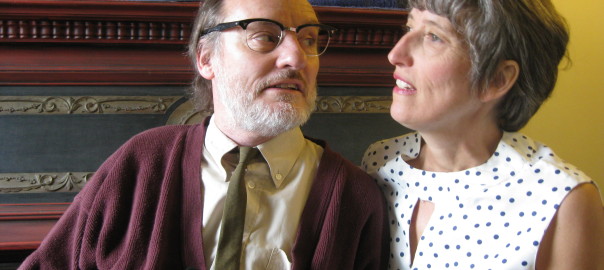
When a composer says to play “largo desolato,” in terms of musical notation, he or she directs symphony musicians to perform “big and lonely.” Translate that into Czech playwright Václav Havel’s native tongue and “largo desolato” means “the general void.” Generic Theater’s performance of “Largo Desolato” at The Players’ Ring in Portsmouth offers both these notions for examination. Generic Theater resurrects their theatrical exploration of “captivity,” both actual and imagined, for the next few weeks.
Generic Theater produced “Largo Desolato” 16 years ago at the McDonough Street Studio. It was just a few years after the USSR’s breakup liberated Czechoslovakia and brought Havel onto a world stage in a leadership role. It is oddly circular, observed actor Roland Goodbody, to “be mounting the production again with the similar backdrop of Egypt, Tunisia, Bahrain and perhaps Libya so present in recent political consciousness.”
In an interview at UNH’s Dimond Library, where Goodbody works in Special Collections, he shared what it’s been like to revisit the role of Leopold Nettles he played over a decade and half ago.
“Of course I’m 16 years older and so I have a more informed perspective and a more complicated interpretation. I appreciate Havel more as a playwright than I did before. I see Havel’s sophistication in a way I didn’t. He’s taken a phenomenological approach, looking at reality as both an objective state and perceived experience,” Goodbody said.
The play explores a small slice of history as Havel examines the double-edged sword of leadership. Philosopher/writer Leopold Nettles (like Havel) is thrust into a powerful position as dreamer and spokesperson for an unnamed resistance movement. He’s become a lone eloquent voice for a diverse people. Half the “people” want him to speak up, while their counter forces want him to renounce what he’s said in the past and then shut up. Nettles, in a claustrophobic cage of an apartment, becomes isolated to the point of despair. He appears to be under house arrest, but the possibility arises that he’s chosen his own punishing limbo.
“Philosophically, the play explores personal agency and questions what responsibility being a leader raises,” Goodbody said. “Nettles is a man who sparks a revolution and then doesn’t want to lead it as much as others want him to.”
The production, directed by Peggi McCarthy with set design by Cary Wendell, works in the tradition of “the theatre of the absurd.” There is much repetition of lines, with minute variations from multiple characters. There’s circularity of conversation and action, and, said Goodbody, “People behaving oddly, with an almost clowning oddness, which might capture the oddness of the culture at the time.”
Nettles is surrounded by this oddness. There are three lovers: Suzana, an ex played chillingly by Susan Turner; Lucy, a present girlfriend played both humorously and despairingly by Helen Brock; and a potential future lover, Marguerite, played fawningly and playfully by Kate Quisumbing.
Nettles also has two comrades: Edward (Mike Pomp) who questions and seemingly cuckolds him, and Bertram (Alan Huisman) who berates him in a most withering display. A pair of working class stiffs, both named Sidney (Steve Ericson and Richard Di Mario), inject smoking, drinking, off-kilter conversations and discomfort while bringing Nettles his writing supplies. The ensemble is filled out by trench-coated men and chaps (Cary Wendell, Betsy Kimball, and Peter Michaud) who appear to mock, menace, and threaten, and are the coiled force of which to be afraid.
Havel wrote this semi-autobiographical play within a year of his prison release in 1984. It’s a creative and cathartic play for Havel, after hard labor and house arrest. Imagine a smart, mouthy, chain-smoking Czechoslovakian philosopher in a western bloc communist country going from non-partisan, non-political guy to president of an independent democratic country in about 20 years. That’s Havel’s real trajectory, a life which unfurled at a breakneck pace. Raised in communist Prague, he went from affluent kid, to chemistry factory worker, to phenomenologist philosopher, to thwarted (then banned, then jailed dissident) playwright. He became an outspoken cultural critic and sought to reclaim fundamental human rights guaranteed to citizens through their Constitution, yet denied by the communist leadership.
The dialogue is at once deeply unnerving and absurdly funny: Edward: “Well, perhaps there’s something wrong with you.” Leopold: “I’m afraid not.” Edward: “Well that’s something to be thankful for, isn’t it?” Leopold: “I’d rather be ill than be well like this.”
Goodbody thinks the play “is more about philosophy than politics. It’s really a close look at one person’s experience. And even if he’s an ass, we feel some sympathy. Leopold is so uncertain, and has no sense of destiny.” Yet his friends, lovers, and some countrymen rally around him. “As an actor I find this intriguing and a bit bemusing. Ninety-nine percent of the time, I’m onstage and it’s easy—easier than coming and going. I don’t have to think about all those between parts when I’m on, I just wait until someone asks me a question and I’m on to Leopold’s circularity again: his pills, inebriation, constipation, and disorientation in times.”
The play ends where it begins, with Leopold’s furtive glances out the peephole and surreptitious listening as history gets in line to repeat itself.
— Rick Agran
“Largo Desolato” runs through April 17 at The Players’ Ring, 105 Marcy St., Portsmouth, 603-436-8123. Show times are Fridays and Saturdays at 8 p.m. and Sundays at 4 p.m. Tickets are $14 for the general public or $12 for seniors and students ($2 discount for members).
